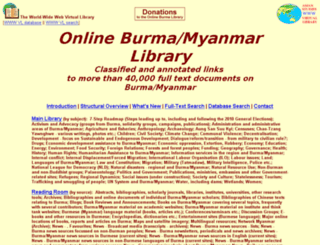Focal point
Location
The Online Burma/Myanmar Library (OBL) is a non-profit online research library mainly in English and Burmese serving academics, activists, diplomats, NGOs, CSOs, CBOs and other Burmese and international actors. It is also, of course, open to the general public. Though we provide lists of Burma/Myanmar news sources, the Library’s main content is not news but in-depth articles, reports, laws, videos and links to other websites, We provide a search engine (database and full text) and an alphabetical list of categories and sub-categories, but the Library is best accessed through browsing the 100 or so categories which lead to sub- and sub-sub categories. These tools should be used in combination.
Members:
Resources
Displaying 656 - 660 of 1151Burma Human Rights Yearbook 2007: Landmines
Antipersonnel landmines continued to be deployed in significant numbers in Burma during 2007, despite a growing international consensus that the use of landmines is unacceptable and that their use should be unconditionally ceased. As of mid-August 2007, 155 countries, or 80 percent of the world’s nations were State Parties to the 1997 Convention on the Prohibition of the Use, Stockpiling, Production and Transfer of Anti-Personnel Mines and on Their Destruction (also known as and henceforth referred to as the Mine Ban Treaty’), leaving only 40 countries outside the treaty.
Burma Human Rights Yearbook 2007: Chapter 17: The Situation of Refugees
Chapter Navigation
The Caribbean Connection
Gas and oil companies are using offshore tax havens to disguise their investments in Burma...
"BANGKOK — GAS and oil companies are using British offshore tax havens in the Caribbean and Bermuda to disguise their investments in Burma, avoiding international sanctions and public attention.
Enlarge Image
Despite US and EU sanctions, intended to isolate the military regime and force democratic change, Burma’s natural gas industry in particular is booming.
Energy Security: Security for Whom?
In military-ruled Burma, also known as Myanmar, large-scale natural gas
projects have directly and indirectly led to violations of basic human rights
through the complicity of multinational corporate actors. These abuses are
ongoing and there is an unreasonably high risk they will increase as more gas
projects are developed. This paper assesses the past, present, and future human
rights impacts of large-scale natural gas extraction in Burma, and the
implications these impacts have in terms of corporate accountability. The
Cultivating Inequality (Review of Ikuko Okamoto's "Economic Disparity in Rural Myanmar" )
A Japanese study illustrates how farmers created an agricultural market in spite of the military government’s bureaucrats...
"Economic Disparity in Rural Myanmar" by Ikuko Okamoto. National University of Singapore Press, 2008...
"THE devastation caused by Cyclone Nargis and spiraling global food prices have placed even more pressure on the agricultural sector of Burma, once the world’s largest rice exporter and potentially one of Asia’s most prodigious producers of agricultural staples.


